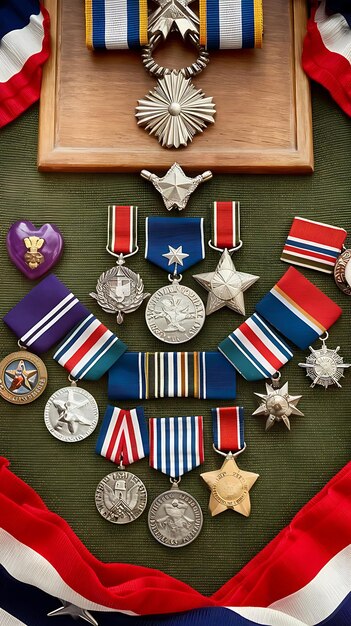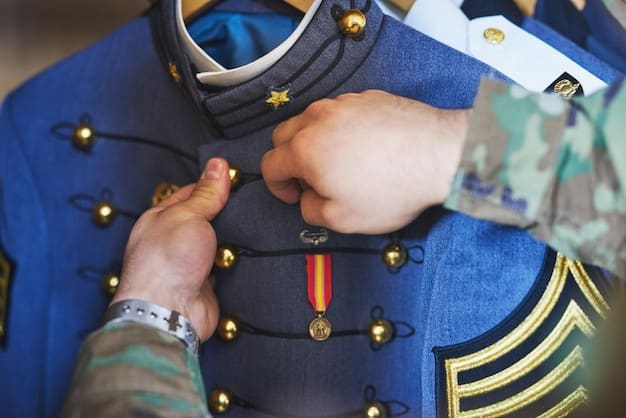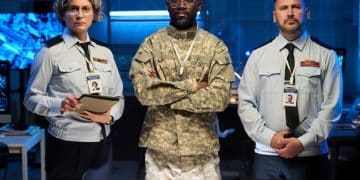Military Awards and Decorations Significance in 2025

Military awards and decorations in 2025 continue to serve as vital symbols recognizing extraordinary valor, service, and achievement, motivating personnel, fostering esprit de corps, and reflecting evolving military values and priorities.
The significance of military awards and decorations in 2025 extends beyond mere symbols; they represent a tangible recognition of the sacrifices, achievements, and unwavering dedication of service members. As we navigate an ever-changing world, these honors continue to play a crucial role in fostering morale, honoring valor, and upholding the rich traditions of military culture.
Understanding the Core Significance of Military Awards
Military awards and decorations serve as a fundamental pillar within any armed force, embodying a profound significance that extends far beyond their metallic form. These symbols of recognition embody the values, achievements, and sacrifices that define military service. Understanding their core significance is crucial to appreciating their enduring importance, particularly as we look toward 2025 and beyond.
At their essence, military awards acknowledge and honor exemplary conduct, valor in the face of danger, and dedication to duty. They stand as a testament to the extraordinary efforts of individuals and units, motivating others to strive for excellence.
Recognizing Valor and Sacrifice
Military awards play a vital role in acknowledging acts of valor and sacrifice made by service members. These awards serve as a public acknowledgment of the risks undertaken and the sacrifices made in the line of duty.
Motivating Excellence in Service
Beyond recognizing past achievements, military awards function as powerful motivators, driving service members to strive for higher levels of performance and dedication. The possibility of earning recognition for outstanding service can significantly boost morale and encourage a culture of excellence within military units.
- Reinforcing core values such as courage, integrity, and selfless service.
- Promoting a competitive spirit and a desire for self-improvement.
- Inspiring future generations of service members to emulate the actions of award recipients.
In conclusion, the core significance of military awards lies in their ability to both recognize outstanding contributions and foster a culture of excellence and dedication within the armed forces. As we advance toward 2025, these honors will undoubtedly continue to be crucial for sustaining morale, reinforcing values, and inspiring future generations of service members.

The Evolving Role of Decorations in Modern Warfare
As military strategy and technology continuously develop, the role of military awards and decorations must also adapt to remain relevant and effectively honor modern service. Modern warfare presents new challenges and demands a fresh perspective on how we recognize and reward military personnel.
In modern warfare, acts of valor can take many forms, some of which may not be immediately apparent or easily quantified. Cyber warfare, support roles, and humanitarian missions all demand recognition that goes beyond traditional combat scenarios.
Adapting to New Forms of Valor
The concept of valor is evolving, with new forms of bravery emerging in the digital age. Recognizing these diverse acts of courage requires a more nuanced and comprehensive evaluation process.
Recognizing Technological Expertise
The increasing reliance on technology in modern warfare has led to a growing need for specialists in areas such as cyber security, drone operation, and data analysis. Awards must acknowledge and reward the expertise and dedication of these technological specialists.
- Creating new award categories to recognize contributions in cyber warfare and technological innovation.
- Developing evaluation criteria that accurately assess the impact of technological expertise on mission success.
- Ensuring that technological specialists have equal opportunities for recognition compared to those in traditional combat roles.
In conclusion, the role of military awards and decorations in modern warfare is evolving to reflect the changing nature of conflict. By adapting recognition criteria and creating new award categories, the military can ensure that all forms of service and valor are appropriately honored, fostering a culture of excellence and innovation across all ranks and specialties.
Future Trends Shaping Military Recognition in 2025
Looking ahead to 2025, several emerging trends are poised to significantly shape the landscape of military awards and decorations. These trends reflect broader shifts in military culture, technology, and global security dynamics.
Understanding these trends is crucial for ensuring that military recognition systems remain relevant, fair, and effective in motivating and honoring service members.
Increased Emphasis on Non-Combat Achievements
As the military increasingly engages in humanitarian missions, peacekeeping operations, and cyber warfare, there will be a growing emphasis on recognizing non-combat achievements.
Technological Advancements in Award Tracking
Technological advancements, such as blockchain and AI, offer opportunities to streamline the award nomination and tracking process, ensuring greater transparency and efficiency. Blockchain technology can provide a secure and immutable record of each award, reducing the risk of fraud and errors.

- Implement AI-powered systems to analyze performance data and identify deserving candidates for awards.
- Develop user-friendly online platforms for submitting nominations and tracking award status.
- Utilize blockchain technology to create a secure and transparent record of all military awards.
In conclusion, future trends will significantly impact military recognition in 2025. By embracing technology and adapting to the evolving nature of military service, the armed forces can ensure that their awards systems remain relevant, fair, and effective in honoring and motivating service members.
The Impact of Awards on Morale and Retention
Military awards and decorations play a critical role in boosting morale, fostering a sense of belonging, and ultimately improving retention rates within the armed forces. Recognition of service members’ contributions and sacrifices can have a profound impact on their overall satisfaction and commitment.
When service members feel appreciated and valued, they are more likely to remain in the military, contributing their experience and expertise to the organization.
Boosting Morale Through Recognition
Receiving a military award can significantly boost morale by providing a tangible symbol of appreciation for a service member’s contributions. Such recognition validates their efforts and makes them feel valued by their peers and superiors.
Fostering a Sense of Belonging
Military awards can also foster a sense of belonging by creating a shared identity and a common bond among service members. Awards ceremonies and other recognition events provide opportunities for service members to connect with each other and celebrate their collective achievements.
In conclusion, the impact of awards on morale and retention is undeniable. By thoughtfully designing and administering their recognition systems, the military can create a more positive and supportive environment, attract and retain talented personnel, and ensure the long-term success of the armed forces.
Public Perception and Trust in Military Honors
The credibility and significance of military awards are intrinsically tied to public perception and trust. When the public views military honors as genuine reflections of exceptional service and valor, these awards hold greater weight and inspire confidence in the armed forces.
Maintaining transparency and ensuring ethical administration of award processes are essential for preserving public trust and upholding the integrity of military honors.
Ensuring Transparency and Accountability
To maintain public trust, it is crucial to ensure transparency and accountability in the award nomination and selection processes. This includes clearly defining eligibility criteria, providing detailed justifications for award decisions, and establishing mechanisms for addressing complaints and appeals.
Combating Fraud and Misrepresentation
Instances of fraud and misrepresentation involving military awards can severely damage public trust and undermine the credibility of the entire system. Robust measures must be implemented to prevent and detect such incidents, including thorough background checks, verification of award claims, and strict penalties for offenders.
- Strengthening regulations and enforcement mechanisms to prevent and punish fraudulent claims of military awards.
- Implementing public awareness campaigns to educate citizens about the significance of military honors and the consequences of misrepresentation.
- Collaborating with veterans’ organizations and law enforcement agencies to investigate and prosecute cases of award fraud.
In conclusion, public perception and trust are essential for maintaining the significance of military honors. By ensuring transparency, combating fraud, and clearly communicating the values and criteria behind military awards, the armed forces can strengthen public confidence and uphold the integrity of these important symbols of recognition.
The Future of Military Awards: A Look at 2025 and Beyond
As we look towards 2025 and beyond, the future of military awards is poised for continued evolution, adapting to the changing nature of conflict, technological advancements, societal values, and the needs of a diverse and highly skilled force.
Embracing these changes, while upholding the core principles of valor, service, and dedication, will be essential for ensuring that military awards remain relevant, meaningful, and effective in inspiring excellence across all ranks and specialties.
Embracing Technological Integration and Innovation
The integration of technology will continue to revolutionize military awards, streamlining the nomination process, enhancing tracking capabilities, and providing new ways to recognize and celebrate service member achievements.
Promoting Inclusivity and Diversity
As the military becomes more diverse and inclusive, award systems must reflect and celebrate the contributions of individuals from all backgrounds and specialties. This includes ensuring equal opportunities for recognition, regardless of gender, race, ethnicity, religion, or sexual orientation.
- Implementing diversity and inclusion training for award selection committees.
- Reviewing award criteria to ensure they are free from bias and accurately reflect the contributions of all service members.
- Creating new award categories to recognize achievements in areas that promote diversity and inclusion within the military.
In conclusion, the future of military awards is bright, filled with opportunities to embrace innovation, promote inclusivity, and strengthen public trust. By adapting to the changing landscape and remaining committed to the core values of valor, service, and dedication, the armed forces can ensure that military awards continue to serve as powerful symbols of recognition, motivation, and inspiration for generations to come.
Key Highlights of Military Awards in 2025
Key Point
Brief Description
🏅 Recognizing Valor
Honoring acts of bravery and sacrifice in both traditional combat and modern warfare settings.
🚀 Technological Expertise
Acknowledging contributions in cyber warfare, drone operation, and data analysis through specialized awards.
🤝 Public Trust
Maintaining transparency and ethical administration to ensure public confidence in military honors.
🌟 Boosting Morale
Awards boost morale and retention by fostering a sense of belonging and recognition.
Military Awards and Decorations in 2025
What are the key criteria for receiving military awards in 2025?
Receiving military awards in 2025 will still consider valor, meritorious service, and specific achievements, but with added emphasis on adaptability and technical expertise, reflecting the evolving nature of military operations.
How are military awards expected to motivate service members in 2025?
Military awards are expected to motivate by recognizing a broader range of contributions, including humanitarian efforts and technological advancements, thereby encouraging diverse skill sets and dedication among service members.
What role does technology play in awarding military decorations in 2025?
Technology streamlines the award nomination process, enhances tracking, and facilitates transparency, ensuring fair and efficient recognition through secure and user-friendly online platforms.
How do military awards support unit cohesion and morale in 2025?
Military awards support unit cohesion by fostering a shared sense of pride and accomplishment, recognizing collective achievements, and reinforcing the importance of teamwork and mutual support.
What measures ensure the integrity and fairness of military awards in 2025?
Integrity and fairness are maintained through transparent nomination processes, diverse selection committees, thorough verification of award claims, and mechanisms for addressing complaints, ensuring public trust in the system.
Conclusion
Military awards and decorations continue to hold significant importance in 2025 by recognizing valor, motivating service members, adapting to technological advancements, and fostering unit cohesion, ultimately contributing to a stronger and more effective armed forces.





